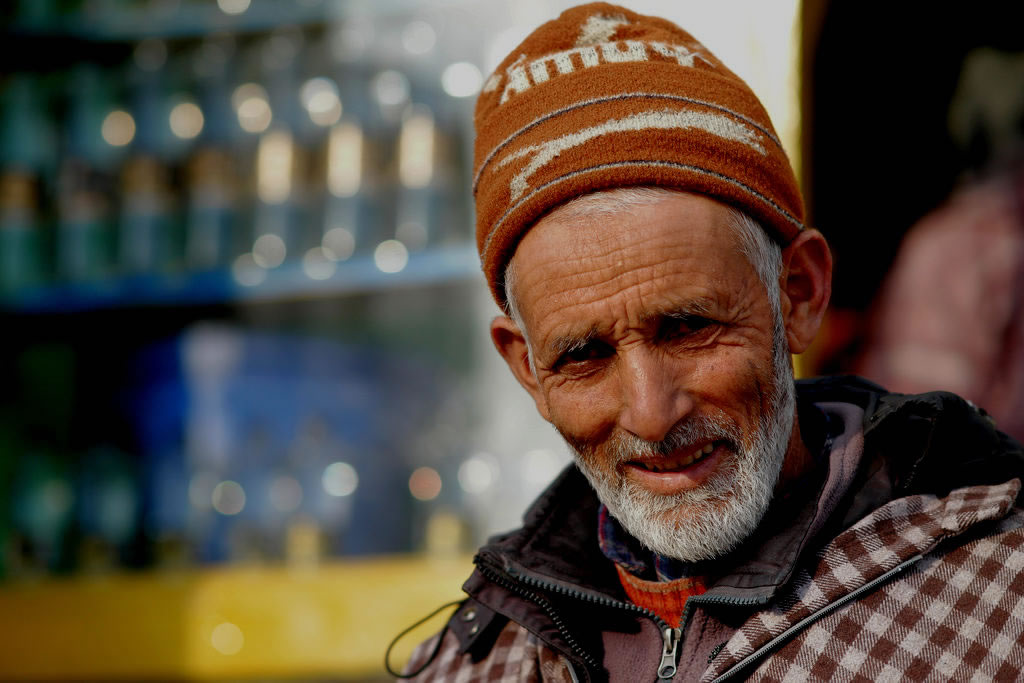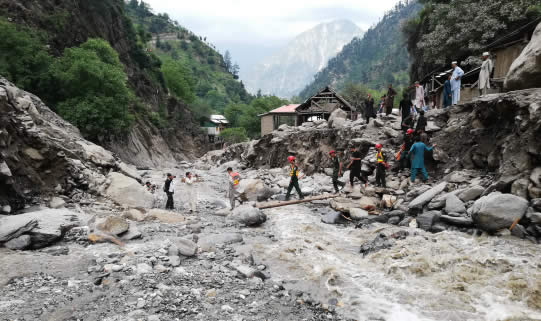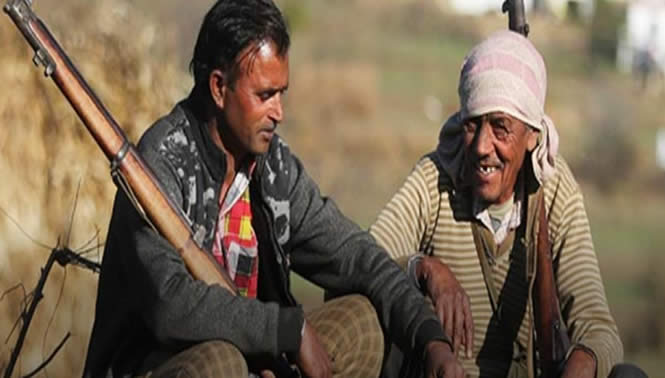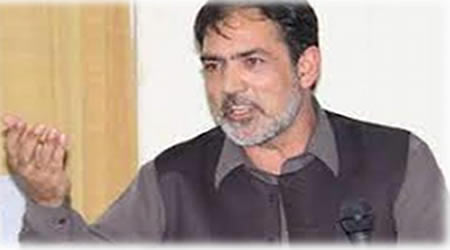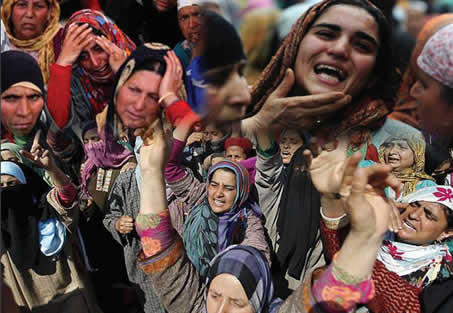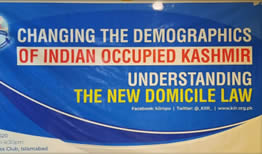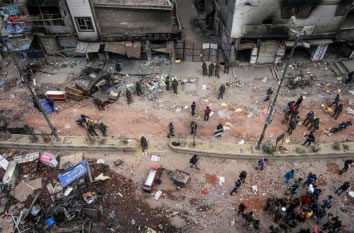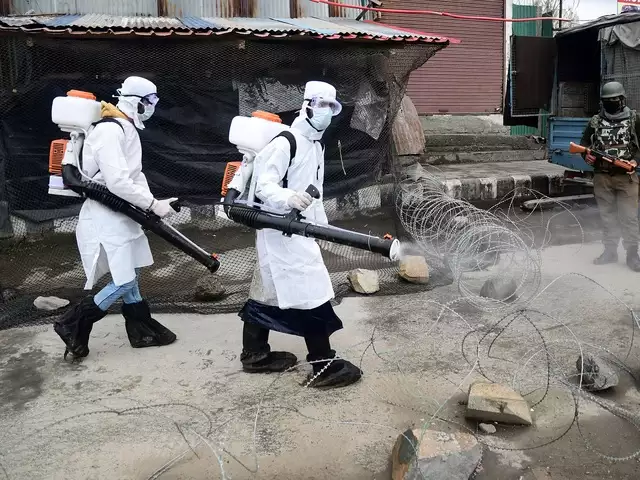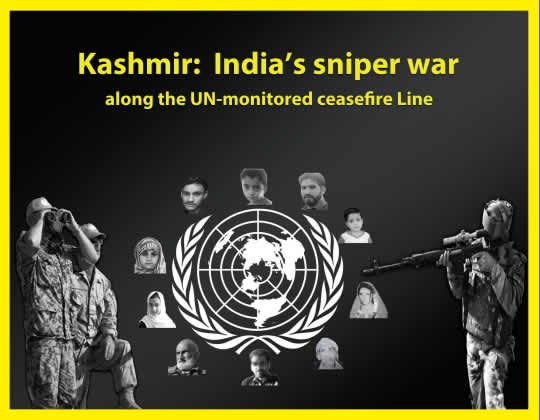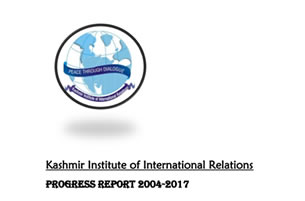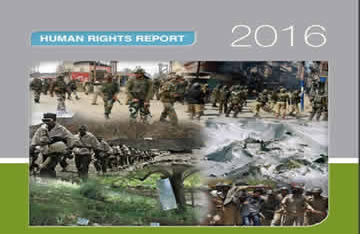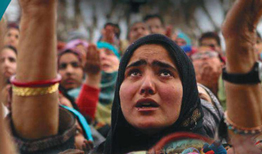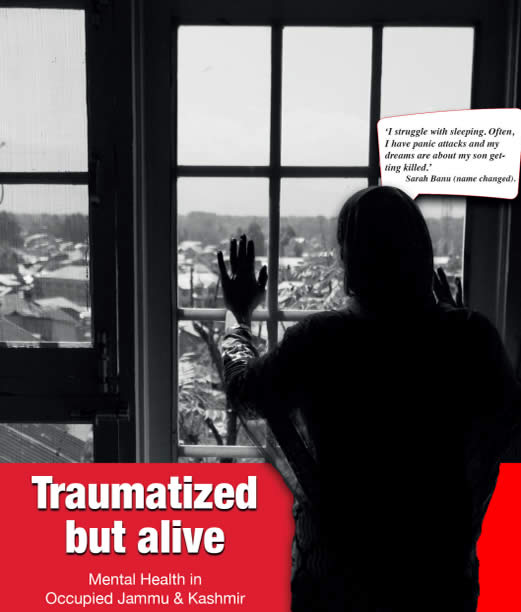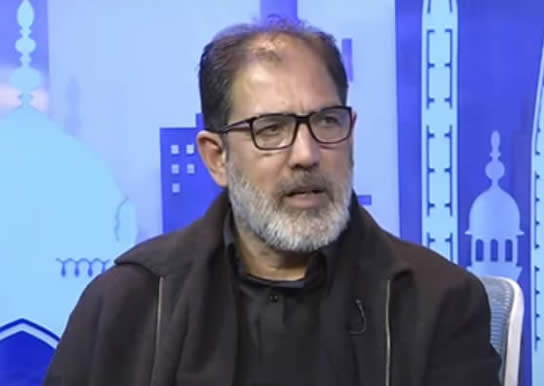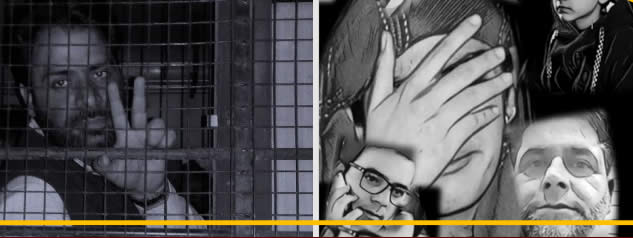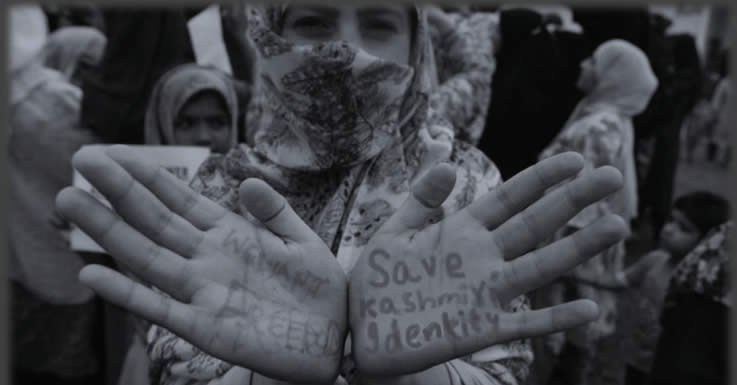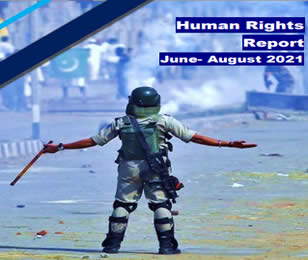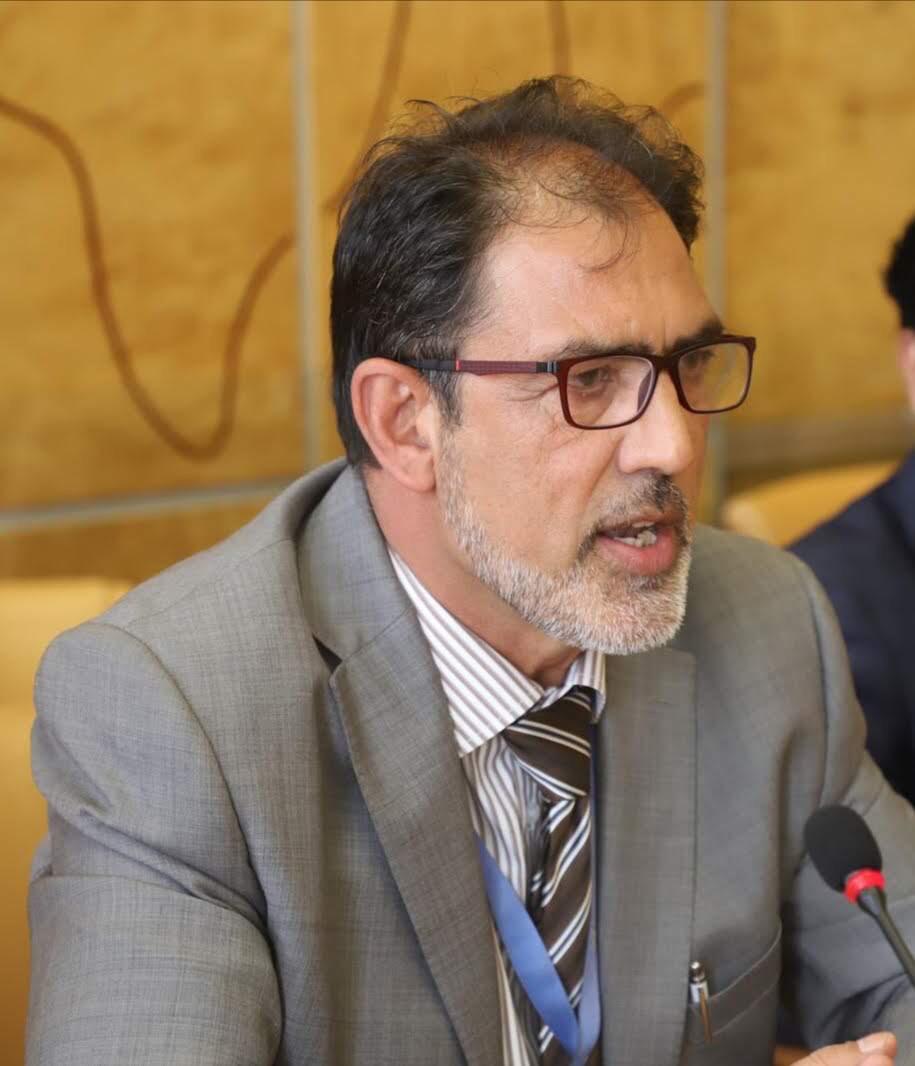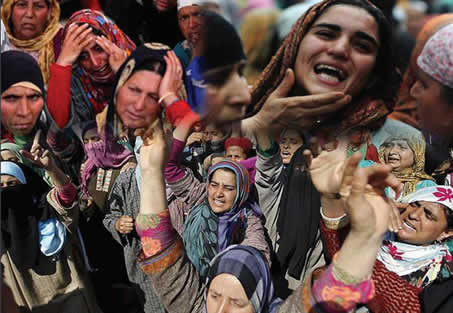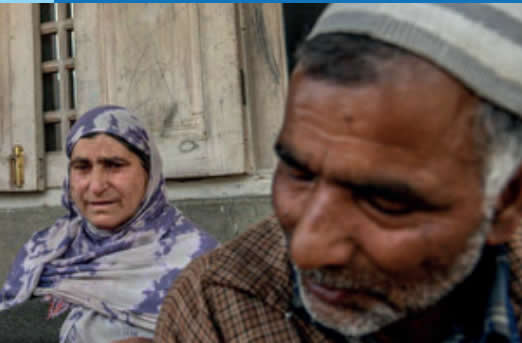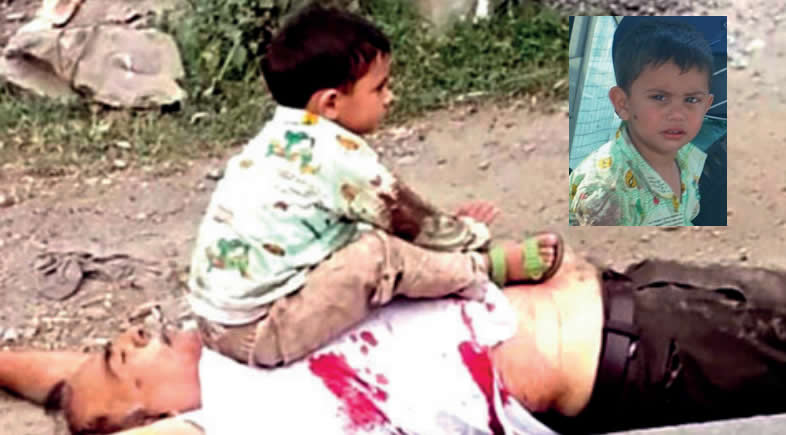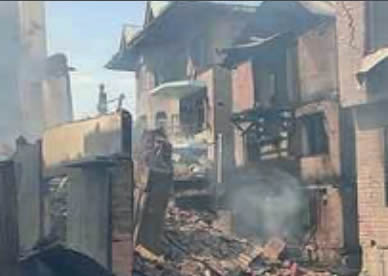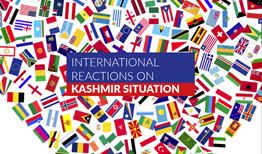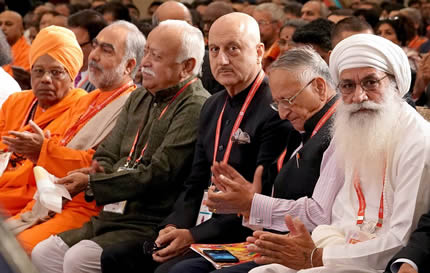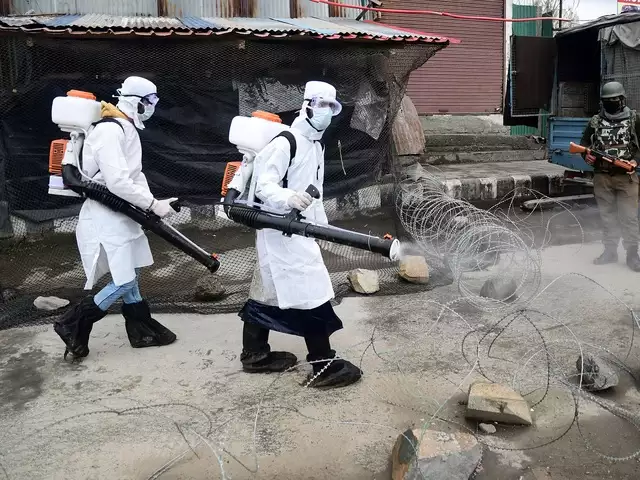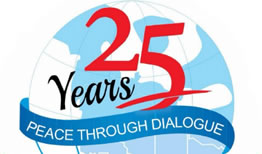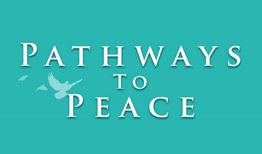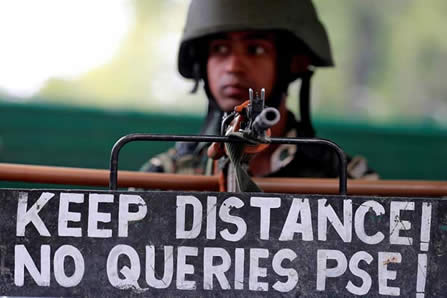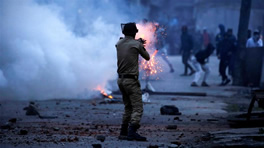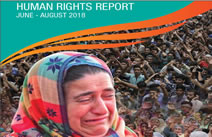Human Rights Report
Human Rights Report
INTRODUCTION
August 5, 2024, marked the fifth anniversary of the abrogation of Article 370, a pivotal moment in the history of Jammu and Kashmir. Since its revocation on August 5, 2019, India has significantly intensified its military presence in the region, deploying over 100,000 troops, making it one of the most militarized areas globally. The Armed Forces (Special Powers) Act (AFSPA) of 1990 has been instrumental in perpetuating an environment of impunity, granting Indian forces broad powers and immunity from prosecution. Under the Bharatiya Janata Party (BJP) led by Prime Minister Narendra Modi, severe human rights violations have been reported in Jammu and Kashmir, resulting in prolonged suffering for the Kashmiri people. The abrogation of Article 370 marked the beginning of an intensified campaign of suppression and control, rooted in a strategy of settler colonialism. This approach has systematically eroded the political, cultural, and religious identity of the Kashmiri people, violating their right to self-determination as enshrined in international law.
Modi’s administration exemplifies a blatant disregard for civil liberties and democratic norms. The extensive deployment of military forces, coupled with curfews and communication blackouts, has severely restricted freedom of movement, speech, and assembly. Thousands of Kashmiris have been detained without trial, enduring harsh conditions in distant prisons, which contravenes international human rights standards, particularly the International Covenant on Civil and Political Rights (ICCPR), to which India is a signatory. Despite the Modi government’s claims of normalcy, the region remains in a state of perpetual conflict, characterized by widespread violence and human rights abuses perpetrated by Indian armed forces. Reports of extrajudicial killings, enforced disappearances, and torture occur with alarming frequency, creating an atmosphere of fear and insecurity. The lack of accountability for these actions underscores a culture of impunity, further entrenching cycles of violence and repression. The economic and social conditions in IIOJK have deteriorated significantly since 2019. Government policies have led to a breakdown in essential services, exacerbating poverty and unemployment. Targeting local businesses and imposing restrictions on tourism have stifled economic growth, depriving Kashmiris of their livelihoods and worsening their suffering.
Despite India’s commitments under various international treaties and United Nations Security Council resolutions, the situation in Kashmir continues to deteriorate. The international community’s response has been largely muted, with human rights organizations’ reports and recommendations often ignored, contributing to the perpetuation of human rights abuses and undermining global norms. Human rights organizations, including Amnesty International and Human Rights Watch, have documented widespread abuses such as extrajudicial killings and torture. The Office of the United Nations High Commissioner for Human Rights (OHCHR) has reported on the use of pellet guns against civilians, resulting in thousands of injuries.
Sexual violence has also been weaponized, with numerous reports of rape and harassment used to humiliate and terrorize the population. The Indian government’s policies are driven by the ideology of Hindutva, marginalizing Muslims and raising concerns about potential genocide. During a visit to Kashmir on March 7, 2024, Modi presented a narrative of development and peace, starkly contrasting the realities of ongoing human rights violations and economic hardships. Despite his claims, Kashmir remains under heavy military presence, with fundamental freedoms severely curtailed, and a pervasive atmosphere of fear dominating daily life.
EXECUTIVE SUMMARY
The five-year period following the abrogation of Article 370 on August 5, 2019, has been marked by escalating turmoil and deepening crises in Indian Occupied Jammu and Kashmir (IOJK). Over this period, the region has witnessed escalating state repression and counter- insurgency operations, marked by severe violations of International Human Rights Law (IHRL) and International Humanitarian Law (IHL). This report provides a critical assessment of the profound impacts of this unilateral move, tracing the intensification of state repression, widespread violations of human rights and the deliberate dismantling of the region’s socio-political fabric.
From systemic human rights abuses to an emerging health and environmental catastrophe, these five years have underscored the tragic consequences of the region› saltered status and the international community›s inadequate response. The ongoing conflict in Indian Occupied Jammu and Kashmir (IoJK) remains a significant issue in South Asian geopolitics, with profound implications for international relations and human rights. Over the past seven decades, Indian authorities have meticulously crafted a narrative of «development and normalcy» in the region, masking the harsh realities on the ground. This report, supported by factual data, unpacks the various tactics employed by the Indian government to sustain this façade and examines the broader implications of these strategies.
Machiavellian Deceit: The Narrative of Normalcy India’s assertion that «everything is fine in Kashmir» exemplifies Machiavellian deceit, a deliberate strategy to manipulate perceptions and conceal the true state of affairs, hiding the deep-seated socio-political unrest and human rights abuses that persist in the region. Since the abrogation of Article 370 on August 5, 2019, which revoked the special status of Jammu and Kashmir, the region has faced profound disruptions. Despite claims of progress, the population endures socio-political unrest, economic setbacks and severe restrictions on civil liberties. Through a combination of media restrictions, controlled access, propaganda campaigns and the suppression of dissent, the government has managed to project a deceptive narrative of stability and progress. However, the international community must see through this façade and recognize the urgent need for a just and peaceful resolution to the Kashmir conflict. The occupation authorities maintain a narrative of development disconnected from the lived experiences of Kashmiris, where the hollow promises of economic reform fail to address the underlying issues of instability and deprivation.
Controlled Access and Guided Tours
Access to Kashmir for international diplomats, media and human rights organizations is heavily restricted. This controlled access ensures that only a sanitized version of reality is presented to the outside world. Guided tours for diplomats and media personnel are orchestrated to highlight economic development and normalcy, while areas affected by unrest and human rights abuses are deliberately excluded from these tours. Propaganda Campaigns and Economic Incentives.
The Indian government has launched extensive propaganda campaigns to portray Kashmir as a peaceful and prosperous region. These campaigns downplay human rights abuses and political dissent, presenting a façade of stability and progress. Economic incentives and development packages are offered to buy the silence and cooperation of the local population. These measures are designed to create a veneer of acceptance and contentment, masking the underlying discontent.
Suppression of Dissent
Ruthless suppression of dissent is a key tactic employed to maintain the façade of normalcy. Political leaders, activists and journalists who voice opposition to the government›s narrative are frequently detained or harassed. The use of draconian laws, such as the Public Safety Act (PSA) and the Unlawful Activities Prevention Act (UAPA), allows the government to silence dissenting voices under the guise of national security.
Manipulating Statistics and Military Propaganda
The manipulation of statistics and data is another method used to downplay the extent of human rights abuses, violence and economic hardship in Kashmir. By presenting skewed data, the government aims to project an image of progress and stability. Simultaneously, military propaganda showcases the army›s «humanitarian» efforts and «development» work in Kashmir, diverting attention from the human rights abuses perpetrated by Indian Forces.
Intimidation, Harassment and Disinformation Intimidation and harassment of Kashmiri journalists, activists and civilians who challenge the government›s narrative are widespread. These actions create a climate of fear, discouraging individuals from speaking out. Moreover, the dissemination of fake news and disinformation serves to discredit Kashmiri voices and international criticism, further entrenching the narrative of normalcy.
International Implications
The Indian government›s tactics to maintain the façade of normalcy in Kashmir have significant implications for international relations. The suppression of information and the manipulation of narratives challenge the international community›s ability to accurately assess the situation. This, in turn, complicates diplomatic efforts to address the conflict and advocate for human rights. India›s actions in Kashmir strain its relations with neighboring countries, particularly Pakistan, which has historically contested India›s control over the region. The ongoing conflict and human rights abuses fuel regional instability, posing a threat to peace and security in South Asia.
EXTRAJUDICIAL KILLINGS IN INDIAN OCCUPIED JAMMU AND KASHMIR
Extrajudicial killings in Indian-occupied Jammu and Kashmir have long been a grave concern, drawing international condemnation and highlighting the ongoing human rights crisis in the region. Indian forces have been targeting civilians under the guise of counter-insurgency operations, often labeling them as overground workers (OGWs) without due process. These incidents, which occur frequently, underscore the systemic abuse of power and the denial of justice in the region. Below is a chronological account of some of the reported extrajudicial killings in May, June and July 2024:
Chronological Overview of Incidents
May 1, 2024: Indian Border Security Force (BSF) personnel shot and killed Muhammad Hafiz at the Regal Border Post in Samba. May 6, 2024: Indian occupation forces launched an extensive day-long operation in Redwani, Kulgam, leading to the deaths of two local youths, Basit Dar and Faheem Baba. May 8, 2024: Indian occupation forces killed Momin Gulzar Mir after a prolonged three-day siege and search operation. The circumstances of his death have raised questions about the conduct of the operation and the use of excessive force. May 12, 2024: The body of Muhammad Kabir, who had been detained for two days by Indian occupation forces, was discovered in the Thanamandi area of Rajouri. His death led to massive protests in Lah village, with locals blocking the Rajouri-Thanamandi Road, demanding a thorough investigation into the incident.
The circumstances surrounding his death have fueled suspicions of foul play by Indian forces. May 15, 2024: In the Tangdhar sector of Kupwara, Indian forces killed two youths named Naik Muhammad and Mohammad Danish. June 22, 2024: One person in the Uri Sector was killed by Indian forces. He was identified as Bilal Bhat. The lack of transparency and accountability in these incidents remains a significant issue.
June 26, 2024: Indian forces killed three individuals, Hameed Dar, Riaz Ahmed & Parvez Bhat during a siege and search operation in the Gandoh area of Bhaderwah. July 6, 2024: Four civilians were killed in a military operation in the Chinnigam area of south Kashmir’s Kulgam district. July 7, 2024: Rafiq Ahmad, a 35-year-old Kashmiri truck driver from Karnah, Kupwara, was killed by Indian forces. The family of Rafiq Ahmad has called his death a plain murder, demanding a transparent investigation, but so far, no conclusive action has been taken. July 7, 2024: Indian forces and police martyred two youths, Adil Hussain Wani and Faisal Bashir Lone, in Kulgam. Their families and local residents have strongly asserting that the youths were innocent and were killed in a staged encounter. July 9, 2024: Six civilians were killed in twin military operations in south Kashmir’s Kulgam district. July 18, 2024: Two civilians were killed by Indian forces in the Keran sector of north Kashmir’s Kupwara district..
he documented incidents of extrajudicial killings and violence against civilians in Jammu and Kashmir are not isolated events but rather part of a broader, systematic pattern of state-sponsored violence perpetuated by Indian forces. This pattern reflects a disturbing reality where the very institutions meant to protect citizens are instead engaged in actions that undermine their safety and security. The use of excessive force during routine search operations is a plain example of this brutality. Civilians, often unarmed and uninvolved in any militant activities, are frequently caught in deliberately targeted under the pretext of counter-insurgency. These actions violate the basic principles of proportionality and necessity, which are foundational to international human rights law and the laws of armed conflict.
Moreover, the targeting of non-combatants, including women, children and the elderly, underscores the indiscriminate nature of these operations. The labeling of innocent civilians as militants or overground workers without due process only serves to dehumanize them, making it easier for Indian occupation forces to justify their actions. This dehumanization is a powerful tool in maintaining control over the population, but it comes at the cost of eroding the moral and legal fabric of the state. Perhaps most concerning is the pervasive impunity that allows these abuses to continue unabated.
Despite widespread reports of human rights violations, there is little to no accountability for the perpetrators. This lack of justice not only emboldens those committing these atrocities but also deepens the alienation and resentment among the local population. It sends a clear message that their lives and rights are considered expendable, further entrenching the conflict and making any prospect of peace more distant. These actions are not merely violations of international human rights norms; they are direct assaults on the dignity and humanity of the people of Jammu and Kashmir. The ongoing violence exacerbates the longstanding conflict in the region, perpetuating a cycle of distrust and hostility between the local population and the Indian state. It also fuels international condemnation and undermines India›s standing as a democratic nation committed to the rule of law.
NCREASING MILITARIZATION IN INDIAN OCCUPIED JAMMU AND KASHMIR
The escalating militarization in Indian-occupied Jammu and Kashmir is a critical issue that stresses the region›s entrenched conflict and the Indian state›s heavy-handed approach to control and subjugation. Indian forces hav increasingly saturated the region with military personnel, infrastructure and operations, all of which have far- reaching implications for the local population›s daily lives. Indian forces have established a pervasive military presence throughout the region, justified by the state as necessary for national security and counter-insurgency operations. However, this militarization has led to widespread human rights abuses, severe restrictions on civil liberties and a climate of fear and oppression among the local population.
The heavy deployment of troops, the establishment of military checkpoints and the constant surveillance are not just tactics to suppress dissent but are also part of a broader strategy to maintain control over the disputed territory. The Indian state›s use of laws like the Armed Forces Special Powers Act (AFSPA) grants its forces sweeping powers, including the ability to arrest without warrant and shoot to kill under certain circumstances, which has led to a culture of impunity and normalized atrocities against civilians. On March 8, 2024, the Indian Ministry of Home Affairs and the Ministry of Defence announced the deployment of a 10,000-strong unit of the Indian Army, previously assigned to the western border, to the region bordering China. This move exemplifies India›s strategic military positioning in the area, reflecting not just concerns about regional security but also an intent to maintain a tight grip on Kashmir.
CHRONOLOGICAL ORDER OF MILITARY ACTIVITIES IN IOJK
March 8, 2024: The Indian Ministry of Home Affairs and the Ministry of Defence announced the deployment of a 10,000-strong unit of the Indian Army to the region bordering China. This unit, previously stationed on India›s western border, was relocated to IoJK to reinforce military presence in the area, reflecting India›s strategic concerns and its intent to strengthen control over the disputed territory. May 7, 2024: In anticipation of the sixth phase of polling in Rajouri and Poonch, nearly 200 additional companies of paramilitary forces and Jammu and Kashmir Armed Police (JKAP) were deployed to the region. Each district received approximately 100 companies of Central Armed Police Forces (CAPFs) and Armed Police to secure the electoral process, further militarizing the region and illustrating thestate›s reliance on military force even in civic matters.
June 7, 2024: As part of the preparations for the Shri Amarnath Yatra 2024, an additional 20,000 security personnel from the Central Industrial Security Force (CISF), Central Reserve Police Force (CRPF), Indo-Tibetan Border Police (ITBP) and other units were deployed to IoJK. These forces, added to the 50,000 paramilitary personnel already stationed in the region, reported to the Jammu Police Control before being deployed to strategic locations, highlighting the extensive militarization around religious events. June 15, 2024: The central government directed the deployment of more than 500 companies, totaling around 50,000 personnel from the Central Armed Police Forces (CAPFs), ahead of Prime Minister Narendra Modi›s visit to Kashmir for International Yoga Day on June 21.
This deployment aimed to bolster so called security measures in the region, further entrenching the military presence and deepening the militarization of civilian spaces. June 29, 2024: Ahead of the Amarnath Yatra, the Ministry of Home Affairs (MHA) decided to deploy over 500 companies of Central Armed Police Forces (CAPFs) to IoJK in response to a recent spate of guerrilla attacks in the Jammu region. This large-scale deployment underscored the state›s continued emphasis on military expansion in the region. This chronological sequence of military activities in IoJK demonstrates the Indian state›s increasing reliance on militarization as a means of maintaining control over the region. Each of these actions has contributed to an environment where the local population›s freedoms and rights are severely restricted, perpetuating a cycle of violence, resentment and instability that hinders any prospects for peaceful resolution.
SIEGE AND SEARCH OPERATIONS
Siege and Search Operations (SASO) have become a prevalent strategy employed by Indian occupation forces in Jammu and Kashmir, particularly since their reintroduction in 2017. These operations are characterized by the military›s imposition of a siege on a particular area, followed by intensive searches of homes, businesses and public spaces. While the official narrative frames these operations as necessary to combat insurgency and root out militants, the reality on the ground often paints a different picture. SASO have been marked by numerous human rights violations, including arbitrary detentions, destruction of property and excessive use of force. Civilians, including women, children and the elderly, bear the brunt of these operations. The constant threat and occurrence of SASO create an environment of fear and insecurity among the local population, further alienating them from the Indian state and intensifying the cycle of violence in the region. Below are documented incidents of SASO in IoJK in chronological order:
Chronological Overview of Incidents
May 5, 2024: Indian occupation forces initiated a search operation in the Shahsitar area of Surankote, Poonch district, following an attack on an Indian Air Force (IAF) convoy. The operation led to the detention of several civilians. May 8, 2024: A joint team of the Indian Army, CRPF and police launched a search operation across several villages in Rajouri, including Adgi, Dana, Dalhodi, Bhangai, Shahdara Sharif, DKG and Azmatabad. May 9, 2024: The search operation in Shahsitar, Gursai, Sanai, Lasana and surrounding areas continued for the sixth day without any breakthrough. A new search operation was initiated in the Akhnoor belt. May 13, 2024: Indian occupation forces cordoned off Jathana village in Kathua district and conducted a siege and search operation. The operation involved a joint team of Jammu and Kashmir Police, the Army and paramilitary forces. May 21, 2024: Indian occupation forces continued a siege and search operation in Wagad, Tral area of Pulwama, following an encounter. The operation, which began on May 20, involved additional forces, guarded exits and drone surveillance.
May 30, 2024: A cordon and search operation was launched by Indian occupation forces in the Marha Buffliaz area of Poonch district. June 3, 2024: Indian troops initiated a cordon and search operation in the Nihama area of Pulwama, resulting in the deaths of two civilians. June 10, 2024: Indian occupation forces began a siege & search operation in Reasi which resulted in ten fatalities. The operation involved the use of drones and the participation of the State Disaster Response Force (SDRF). June 11, 2024: A large-scale siege & search operation was launched in a forest area in Seda Sohal, Kathua district, after reports of suspicious movement. The operation led to the deaths of two civilians. June 13, 2024: Extensive siege & search operations were carried out across various districts in IoJK, including Doda and Reasi, targeting civilians.
June 18, 2024: A siege and search operation in Rafiabad village, Baramulla district, resulted in the deaths of Usman and Umar. The operation led to traffic diversions and the closure of two educational institutions. June 26, 2024: In the village of Sinoo panchayat, Indian occupation forces launched an operation. Three civilians were killed in firing by Indian forces. July 6, 2024: Indian forces conducted a siege and search operation in the Chinnigam area of south Kashmir’s Kulgam district, resulting in the killing of four civilians. July 9, 2024: Indian forces carried out twin siege and search operations in south Kashmir’s Kulgam district, leading to the deaths of six civilians. July 18, 2024: In the Keran sector of north Kashmir’s Kupwara district, Indian forces conducted a siege and search operation that resulted in the killingof two civilians.
These operations not only disrupt the daily lives of the civilian population but also contribute to the broader human rights crisis in the region, raising serious concerns about the conduct of Indian occupation forces in Jammu and Kashmir. Despite condemnation from international human rights organizations, Indian authorities continue to disregard calls for an end to such violations, highlighting the persistent militarization and repressive tactics employed in IIOJK. In January 2024, a siege and search operation has lasted seven consecutive days, with no end in sight. From January to July 2024, 202 such operations have taken place in Jammu and Kashmir.
BAN ON DISSENT IN IOJK
The imposition of stringent restrictions on dissent in Indian Occupied Jammu and Kashmir (IOJK) represents a troubling escalation in the region’s long-standing struggle for freedom and justice. The Indian authorities have systematically targeted dissenting voices, including legal and political entities, through repressive measures such as banning pro-freedom organizations, imposing restrictions on lawyers› bodies and enacting severe surveillance protocols. These actions are part of a broader strategy to stifle opposition and suppress calls for self-determination and human rights. This approach has not only curtailed the democratic space but has also intensified the suffering of Kashmiris, as they face increasing constraints on their ability to advocate for their rights and freedoms.
Chronological Overview of Incidents May 8, 2024: Kashmiri journalist Asif Sultan was granted bail by a court in Srinagar, two months after being detained in a five-year-old case. Sultan had been imprisoned since 2018 under the Unlawful Activities (Prevention) Act (UAPA) and later under the Public Safety Act (PSA). The court imposed strict bail conditions, including a ban on using encrypted messaging apps and requiring court permission to purchase a new mobile phone or SIM card. May 21, 2024: Jammu and Kashmir›s Anti-Corruption Bureau (ACB) filed an FIR against Hurriyat leader Mirwaiz Umar Farooq, a bureaucrat and five others. The FIR alleges encroachment on evacuee land in collaboration. with revenue officials in Srinagar. The investigation, assigned to a DSP-rank officer, involves sections of the Jammu and Kashmir Prevention of Corruption Act and section 120 RPC.
May 24, 2024: The High Court of Jammu and Kashmir and Ladakh nullified the detention of 26-year-old Irfan Ahmad Kuttay under the Public Safety Act. The court found that the authorities had not properly reviewed the grounds for detention, indicating a ‹non-application of mind›. Kuttay had been detained by the District Magistrate of Shopian on June 5, 2022 and held in District Jail, Baramulla. May 29, 2024: Police in Baramulla fitted a GPS tracking device on an individual released on bail. This person, arrested under various sections of the UAPA, Indian Penal Code and Arms Act, will be monitored via a GPS anklet to ensure adherence to bail conditions. May 30, 2024: Anantnag police attached GPS tracking devices to the aides of under-trial persons.
These individuals, who had been released on bail in a case under the UAPA, had their movements tracked to ensure compliance with bail conditions. June 1, 2024: In Sopore, Jammu and Kashmir Police placed GPS-enabled anklets on two bailed-out terror associates to monitor their movements. The individuals, Aamar Mehraj Kaboo and Waseem Manzoor Gazi, had been arrested under various sections of the IA Act and UAPA. June 4, 2024: The High Court of Jammu and Kashmir and Ladakh nullified five detention orders issued under the PSA and ordered the immediate release of the detainees. The court invalidated the PSA orders for Ikhlaq Gulzar Thokar, Ajaz Ahmad Khan, Javaid Ahmad Kaloo and Tahir Shameem Lone.
June 8, 2024: Following an order from the NIA Court Kulgam, police in Shopian attached a GPS tracking device to Sameer Ahmad Bhat, a bailed-out terror associate, to monitor his movements and ensure adherence to bail conditions. June 11, 2024: The Hon’ble Court of Sub Judge Uri declared eight individuals as terror handlers. This declaration was made following an application by Baramulla Police and proclamation orders under section 87 CrPC were obtained against these individuals. June 15, 2024: Delhi’s Patiala House Court granted statutory bail to Kashmiri separatist leader Shabir Ahmad Shah in a money laundering case under the Prevention of Money Laundering Act (PMLA). Despite this, Shah remained in custody due to other pending cases. June 25, 2024: The District Magistrate of Srinagar imposed strict restrictions on the upcoming elections of the J&K High Court Bar Association. This decision followed a notification from the Bar Association announcing the election schedule and was based on concerns about the legality of the Bar Association›s activities and potential breaches of peace.
June 29, 2024: The J&K and Ladakh High Court recognized a new lawyers’ body, the Kashmir Advocates Association, by exercising powers under Section 58 of the Bar Council. This move occurred just four days after restrictions were imposed on the JK-HCBA, a long- standing lawyers› body. Criminalizing Dissent: The Persecution of Arundhati Roy and Sheikh Showkat The recent decision by Delhi›s Lieutenant Governor Vinai Kumar Saxena to grant prosecution sanction against Arundhati Roy and Sheikh Showkat under the UAPA for their alleged «provocative speeches» at a 2010 event is a troubling development that raises serious concerns about the erosion of free speech in India. This action, based on a decade-old complaint, not only threatens to stifle dissent but also sets a dangerous precedent for the use of anti-terror laws to silence critics.
The United Nations Human Rights Office has rightly urged the Indian government to reconsider this move, highlighting the misuse of the UAPA to target individuals who express dissenting views, particularly regarding the sensitive issue of Kashmir. Furthermore, over 200 academics, activists and journalists have condemned this sanction, emphasizing the critical importance of protecting freedom of expression in a democratic society. As the voices calling for the withdrawal of this sanction grow louder, it is imperative that the Indian government upholds the fundamental right to free speech and ensures that such draconian measures are not used to curb legitimate criticism.
Legal Repression: Curtailment of JKHCBA›s Electoral Rights and the Rise of KAA in Kashmir
In a continuation of repressive measures, Indian authorities imposed restrictions on the Jammu and Kashmir High Court Bar Association›s (JKHCBA) election activities under Section 144 of the Criminal Procedure Code (CrPC). This action, taken following concerns raised by the Kashmir Advocates Association (KAA) about the JKHCBA›s alleged secessionist ideology and its provision of legal aid to anti-national elements, highlights the growing suppression of dissent in the region. Just days later, the J&K and Ladakh High Court recognized the KAA as a new legal body, further marginalizing the long-standing JKHCBA and intensifying the legal crackdown on voices advocating for the peaceful resolution of the Kashmir issue.
SUPPRESSION OF FAITH IN IOJK
In Indian Occupied Jammu and Kashmir (IOJK), the suppression of religious freedoms has been a growing concern. Despite the Geneva Conventions guaranteeing the protection of religious rights under occupation, the local administration has increasingly imposed restrictions that undermine these fundamental rights. The recent months have seen a troubling trend of curbing religious practices under the guise of maintaining law and order. Here’s a chronological overview of incidents reflecting the suppression of faith in IOJK:
Chronological Overview of Incidents
May 03, 2024: Mirwaiz Umar Farooq, the Hurriyat Conference Chairman and chief cleric of the historic Jamia Masjid in Srinagar, was barred from delivering his Friday prayers address. Authorities placed him under house arrest, disrupting his ability to lead congregational prayers and sermons. May 10, 2024: Mirwaiz Umar Farooq faced another round of house arrest, again preventing him from addressing Friday prayers at the Jamia Masjid. The Anjuman Auqaf Jamia Masjid, responsible for managing the mosque, condemned his repeated detentions and criticized them as violations of religious freedoms. May 19, 2024: For the third consecutive week, Dr. Maulvi Muhammad Umar Farooq was unable to deliver Friday prayers or attend a Quran reading event in honor of his late father. The restrictions imposed on him were strongly condemned by the Anjuman Auqaf organization.
May 24, 2024: Authorities continued to prevent Mirwaiz Umar Farooq from delivering sermons at the Jamia Masjid for the fourth consecutive Friday. The mosque›s managing body expressed grave concerns over the ongoing interference with religious practices. June 07, 2024: Mirwaiz Umar Farooq was again placed under house arrest on a Friday, preventing him from leading prayers at the Jamia Masjid. The Anjuman Auqaf Jamia Masjid denounced the restriction as an infringement on his religious duties. June 17, 2024: The historic Jamia Masjid was closed to believers for the sixth consecutive year on an auspicious day, preventing traditional prayers. The Anjuman Auqaf Jama Masjid reported that administrative directives halted the 9 a.m. prayers, with the administration refusing to grant permission despite appeals from the mosque›s management.
June 30, 2024: In Kathua district, a joint team of Jammu and Kashmir police and revenue officials attempted to dismantle a mosque early in the morning with bulldozers, allegedly built on government land. There were also attempts to desecrate holy books during this operation. These incidents collectively illustrate a pattern of systematic suppression of religious freedoms in IOJK, undermining the fundamental rights of the Kashmiri Muslim population and exacerbating the ongoing human rights crisis in the region.
ARBITRARY DETENTION AND COERCIVE MEASURES IN KASHMIR
In Indian Occupied Jammu and Kashmir (IOJK), arbitrary detentions have become a significant and troubling aspect of the ongoing conflict. Since August 5, 2019, when the Indian government abrogated the region›s semi-autonomous status, thousands of Kashmiris have been detained under preventive laws without trial or substantial evidence. The arbitrary nature of these detentions, often targeting political leaders, activists and ordinary citizens, highlights severe human rights concerns. Arbitrary detention in Kashmir has persisted as a contentious issue, emblematic of India›s approach to security management in the region. Employing laws such as the Unlawful Activities Prevention Act (UAPA) and the Public Safety Act (PSA), the Indian government. has wielded coercive measures to suppress dissent and control the populace, raising grave concerns regarding human rights violations.
Public Safety Act (PSA)
The Public Safety Act (PSA), enacted in 1978 by the Jammu and Kashmir state legislature, is a preventive detention law aimed at maintaining public order. It allows the authorities to detain individuals without trial for a period of up to two years.
• Human Rights Violations: The PSA has been criticized for being used arbitrarily and disproportionately, leading to numerous human rights abuses. Critics argue that it undermines basic freedoms and due process.
• Lack of Fair Trial: The PSA’s preventive nature means that detainees are often held without trial, which violates principles of justice and fairness. Unlawful Activities (Prevention) Act (UAPA)
The Unlawful Activities (Prevention) Act (UAPA) was enacted in 1967 by the Indian Parliament to combat unlawful activities and terrorism. It is a comprehensive anti-terrorism law applicable throughout India, including Jammu and Kashmir.
• Terrorism vs. Freedom of Expression: The UAPA has been criticized for its broad and vague definitions of terrorism, which can be used to suppress dissent and target political activists and ordinary citizens.
• Harsh Penalties: The Act provides for severe penalties, including life imprisonment and the death penalty, which critics argue can be disproportionately applied.
• Lack of Due Process: There are concerns about the lack of fair trial guarantees and the potential for abuse of power under the UAPA. Here’s a chronological overview of recent incidents reflecting the pattern of arbitrary detentions in IOJK:
Chronological Overview of Incidents
May 01, 2024: Abid Parray was arrested in Chotipora, Shopian by Indian forces during a search operation. The nature of his detention remains unclear. May 05, 2024: Mohammad Zishan was arrested in Rajouri for using a Virtual Private Network (VPN) on his mobile phone, reflecting increased scrutiny of digital communications. May 11, 2024: Suhaib Iqbal and Tufail Yousuf were detained in Shopian district by Indian forces. The arrest involved extensive police and army operations. May 12, 2024: A Kashmiri youth was arrested in Bandipora. The arrest followed a joint operation by the Indian Army and CRPF. May 14, 2024: Zahir Khan, a Pakistani national, was arrested near the Line of Control (LoC) in Akhnoor.
May 16, 2024: Mushtaq Ahmad Lone was arrested in Kupwara by a joint team of the Army, BSF and police. May 16, 2024: Advocate Zahid Ali was re-arrested in Srinagar on charges related to a 2019 case, despite having been previously released. May 19, 2024: Iftar Ahmed, Khurshid Ahmed and Ghulam Abass were detained under the Public Safety Act (PSA) in Poonch. May 19, 2024: Nasim Fatima, a mute woman from Azad Kashmir, was detained by the Indian Army along the LoC in Rajouri district, raising concerns about the treatment of civilians crossing the border. May 23, 2024: Ahsan-ul-Haq, an Over Ground Worker (OGW) for Lashkar-e-Taiba (LeT), was booked under PSA in Baramulla district.
May 24, 2024: Mohd Saleem and Mohd Yaqoob were arrested by Doda Police. May 25, 2024: Bilal Ahmad Shalla was detained under PSA with multiple FIRs filed against him. May 28, 2024: Two civilians were arrested in Islamabad during a joint operation by police and army.May 28, 2024: Doda Police arrested Ghulam Qadir from Punjab. June 05, 2024: Munir Hussain was detained by the Indian Army in Poonch,. June 10, 2024: Bilal Ahmed Lone, Sajjad Ganie and Shakir Bashir were arrested with multiple charges including the UAPA. June 10, 2024: A charge sheet was filed against four civilians in Srinagar. June 13, 2024: Authorities arrested 50 individuals in the Jammu division during siege and search operation.
June 18, 2024: Zakir Hamid Mir was arrested in Handwara. June 19, 2024: Mohammad Rafi was arrested in Doda. June 19, 2024: Hakam Din was arrested in the Reasi. June 22, 2024: Three individuals from Tanta Draman Village were arrested. These incidents highlight a broader pattern of arbitrary detentions in IOJK, often characterized by a lack of due process and allegations of human rights violations, reflecting the ongoing repression in the region
PROPERTY DESTROYED
The destruction or seizure of property, including residential homes and commercial establishments, directly affects the financial stability of affected individuals. Many families lose their primary sources of income and living spaces, which can lead to severe economic hardship. The attachment or destruction of valuable properties, such as land and buildings, results in the devaluation of assets for the owners. This impact extends to potential future earnings from property, affecting long-term financial stability. The process of reclaiming seized or destroyed properties is often complex and lengthy, causing prolonged suffering for affected individuals. Legal battles to recover properties can be expensive and time-consuming, adding to the financial burden. The long-term impact of displacement and property loss can contribute to ongoing instability and socioeconomic challenges. Families that have lost their homes may face difficulties in rebuilding their lives and reintegrating into their communities.
Chronological Overview of Incidents
May 01: The Jammu & Kashmir Police, under an attachment order from the Additional Sessions Court Baramulla, seized properties totaling 8 kanal, 6 marla and 2 sersai from Kashmiri individuals, including Sajad Ahmad Bhat, Irshad Ahmad Khan, Gulla Mochi and others.. May 02: In Baramulla, police attached property worth lakhs belonging to Adrees Ahmad Mir. The property, including 6 Kanals & 10 Marlas of land, was seized under Section 83 CrPC, linked with case FIR No. 91/1998 under the EIMCO Act of Police Station Uri. May 03: The State Investigation Agency in Jammu seized property belonging to Abdul Hameed Khan in Manjakote tehsil of Rajouri district under the Unlawful Activities (Prevention) Act (UAPA)..
May 06: Police in Baramulla seized properties totaling 13 kanals of land, including Shabir Ahmad Sofi and others. May 07: During a cordon-and-search operation in Kulgam’s Redwani village, Indian troops engaged in anencounter which resulted in the destruction of a house. May 08: The National Investigation Agency attached six immovable properties owned by Asif Ahmed Malik, located in Mirpora, Pulwama, under the UAPA. May 09: The National Investigation Agency attached four properties in Kupwara owned by individuals including Mohammad Alam Bhat and others. Two Tata Sumo vehicles were also attached.
May 13: In Baramulla, police seized properties totaling 1 Kanal and 11 Marla, owned by Muhammad Arif Badal and Muhammad Basheer, under Section 83 CrPC.. May 16: The National Investigation Agency seized seven immovable properties belonging to Sartaj Ahmed Mantoo in Pulwama, under the UAPA. May 22: Authorities in Shopian attached the property of Abid Ramzan Sheikh, including his residential house in Chotipora, under Section 4(a)/(c) of 83 CrPC. May 28: Police in Baramulla seized properties totaling 3 Kanals and 19 Marlas of land from Jalal Din and Mohammad Saki under Section 83 CrPC.. May 30: The Enforcement Directorate attached seven immovable properties in Srinagar, valued at Rs 1.56 crore, belonging to Imran Baba and Sageena Yaseen. June 03: Indian forces destroyed two houses in Nehama village, Pulwama, during a cordon-and-search operation. The bodies of Riyaz Ahmad Dar and Rayees Ahmad were recovered from the debris.
June 09: Kashmir Police seized properties worth crores of rupees from Jaleel Ahmad Rather and Mohammad Ashraf Mir in Baramulla. The properties included eight kanals and four marlas of land, seized under Section 83 CrPC. June 12: The Anantnag police seized the two-storey house of Riaz Ahmed Bhatt in Lohar Senzi Gadol, Anantnag. June 26: Jammu and Kashmir police attachedproperties worth Rs 1 crore belonging to Bashir Ahmad Ganie and others in Baramulla. The attachment, ordered by the Baramulla Court, included nine Kanals of land. Since 1989, an alarming 110,510 houses have been destroyed, with 1,116 of these incidents occurring since the abrogation of Article 370 on August 5, 2019. This selective application of the law highlights a systematic strategy of coercion and repression, further exacerbating the humanitarian crisis in the region and contravening the principles of International Humanitarian Law, which mandates the protection of civilian property in conflict zones.
UPPRESSION THROUGH STATE AGENCIES: NIA AND SIA RAIDS IN INDIAN-OCCUPIED KASHMIR
In the shadow of Kashmir›s ongoing unrest, a disturbing pattern of repression has emerged through the actions of the National Investigation Agency (NIA) and the State Investigation Agency (SIA). These agencies have intensified their operations, targeting individuals and properties suspected of involvement in pro-freedom activities. This aggressive campaign, marked by widespread raids and arbitrary detentions, has exacerbated the climate of fear and injustice in the region. The NIA and SIA›s actions have led to the arrest of thousands, including resistance activists, common people, journalists and religious scholars.
The agencies have also attached 76 properties, including residential homes, agricultural lands, shops, poultry farms and vehicles, further entrenching the state’s grip on the region. Since August 5, 2019, the Modi government has illegally detained thousands of Kashmiris, incarcerating them for their political beliefs rather than any criminal activity. In April 2024, NIA and SIA raids targeted nine locations, including organizations like The Resistance Front, United Liberation Front Jammu & Kashmir and Mujahideen Gazwat-ul-Hind, among others. These nocturnal raids, along with property attachments and arrests of innocent youth, highlight the escalating violence and intimidation tactics employed by Indian forces and agencies.
The following are detailed accounts of the raids conducted by these agencies in the first half of 2024: Chronological Overview of Incidents May 9, 2024: The NIA conducted searches at 15 locations across seven districts in Jammu and Kashmir. The targeted districts included Islamabad, Shopian, Budgam, Srinagar, Poonch, Baramulla and Rajouri. These operations were part of an ongoing investigation initiated by the NIA on June 21 of the previous year. May 11, 2024: The NIA carried out raids at six locations in the Jammu division, specifically in the Doda, Ramban and Kishtwar districts.
May 13, 2024: The SIA conducted raids at 11 locations in south Kashmir, focusing on areas in Anantnag, Shopian and Kulgam districts. These raids were conducting in Bijbehara, Islamabad district, last month. Specific areas targeted included Hassanpora, Jablipora and Arwani-
Laktipora. June 8, 2024: The SIA raided the residence of Ahmadullah Malla, a timber dealer in Nawab Bazar and arrested several civilians. The recent raids are part of a broader campaign of persecution and intimidation against human rights defenders, including journalists and activists, who speak out against state policies. This campaign is particularly concerning as India prepares for national elections in 2024.At a time when human rights defenders should be valued for their contributions to communities and promotion of democratic values, Indian authorities continue to crackdown on them under the guise of NIA and SIA raids.
ILLEGAL DISMISSALS FROM GOVERNMENT JOBS IN JAMMU & KASHMIR
Legal Framework and Concerns
• Violation of Due Process: Under Indian law, government employees are protected by specific procedural safeguards, including the right to a fair hearing and the opportunity to contest allegations. The dismissals reported in Jammu & Kashmir often occurred without adherence to these procedural protections.
• Article 311 of the Indian Constitution: Article 311(2) allows dismissal of government employees without formal inquiry under certain conditions, but this is typically reserved for extreme cases. The misuse of this provision for routine or politically motivated dismissals raises concerns about due process violations. Lack of Transparency and
Accountability:
• Opaque Procedures: The lack of transparency in the decision-making process regarding these dismissals, including insufficient information on the specific allegations and evidence, undermines accountability. Government employees dismissed under allegations of misconduct or terrorism should have the right to know the specific charges and present their defense.
• Political Motivations: Allegations of political motivations behind these dismissals suggest that the actions might be driven by factors beyond legal and procedural norms. This can lead to a perception of abuse of power and undermine trust in the administration.
Impact on Affected Individuals:
• Employment Security: Unlawful or unfair dismissals impact not only the affected individuals but also their families, who may face financial and social hardships. Such actions can be detrimental to the professional and personal lives of employees, especially when conducted without proper legal procedures.
• Legal Recourse: Employees who face unjust dismissal may have limited options for legal recourse, especially if administrative actions are perceived as final or biased. This can lead to a lack of effective remedies and protection against wrongful actions. Broader Implications:
• Erosion of Rule of Law: Systematic dismissals without due process can erode the rule of law and contribute to an environment where legal rights are not adequately protected. This may undermine the principles of justice and fairness essential for a democratic society.
• Public Perception: The perception of illegal or unjust dismissals can damage public confidence in government institutions and their adherence to democratic norms. It may also affect the morale of remaining employees and the overall credibility of the administration.
Chronological Overview
May 08, 2024: The Jammu and Kashmir Election Department acted against 40 government employees. Measures included:
• Suspension of five Employees: These individuals were temporarily suspended from their duties.
• Disengagement from Services: Another employee was permanently removed from their position.
• Inquiries: An additional 34 employees were subjected to inquiries. May 23, 2024:
In Ganderbal, authorities acted against two government employees:
• Mushtaq Ahmad Khan: Employed at Government Higher Secondary School (GHSS) Hari Ganiwan.
• Shabir Ahmad Rather: Employed at GHSS Kangan.
• The disengagement of these employees followed orders from the Nodal Officer in Ganderbal. June 09, 2024:
The Jammu & Kashmir administration dismissed four employees. The dismissed individuals included:
• Two Police Constables
• One School Teacher
• One Assistant Lineman
The illegal dismissals from government jobs in Jammu & Kashmir raise significant legal and ethical concerns. They reflect potential violations of due process, transparency issues and the possible misuse of legal provisions for political or administrative purposes.
THE USE OF ELECTIONS AS A POLITICAL TOOL
In 2024, the Indian authorities sought to present the electoral process in Jammu and Kashmir as a beacon of democratic progress amidst heightened military presence. The Election Commission of India’s decision to deploy an additional 635 companies of paramilitary forces in Jammu and Kashmir and 57 in Ladakh underscores the extent of this security buildup. Despite these measures, critics argue that such elections are often a veneer for the ongoing suppression of political and human rights. The continued imprisonment of key political leaders and human rights defenders, including Engineer Rashid, who won despite his incarceration, casts a long shadow over fairness of the process.
Rashid’s inability to take his seat in the Lok Sabha and the BJP’s decision not to field candidates in half of the parliamentary constituencies further fuel doubts about the electoral legitimacy. For many voters, the elections are less an endorsement of Indian policies and more a reflection of a dire political landscape where dissent against New Delhi has become their only avenue for expression. The combination of an intimidating security presence and the suppression of local leadership suggests that these elections are more about maintaining an illusion of normalcy than fostering genuine democratic engagement.
CONCLUSION
As we reflect on the five years since the abrogation of Article 370, the narrative of integration and development promised by the Indian government has starkly contrasted with the harsh realities on the ground. The normalization of violence and the settler-colonial project in Kashmir represent a grave threat to regional stability and international peace. The systematic use of violence to suppress dissent, coupled with demographic engineering to alter the region’s identity, constitutes a clear violation of international norms and human rights. The unprecedented militarization of Jammu and Kashmir has not only intensified the region›s already fraught security situation but has also significantly aggravated human rights violations.
The systematic repression, characterized by arbitrary detentions, enforced disappearances and widespread abuses, highlights a troubling disregard for international human rights standards. Far from achieving the intended goal of normalization, these actions have deepened the humanitarian crisis and perpetuated a cycle of conflict and disenfranchisement. The international community’s muted response to these ongoing violations highlights a critical need for renewed vigilance and advocacy to address the profound injustices faced by the people of Indian occupied Jammu and Kashmir.
Related Reports
